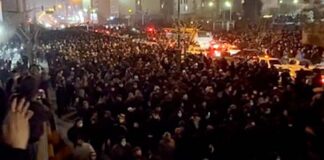The US and Israel have ratcheted up threats and sanctions against Iran. The media presents Iran as aggressive and a danger to the region, hell bent on developing a nuclear weapon. But the real provocations are coming from the US and Israel, whose actual concern is not Iran’s nuclear capabilities, but the threat Iran poses to US domination of the Middle East and its oil supply.
In separate interviews, both Leon Panetta, the US Secretary of Defence, and Israeli Defence Minister Ehud Barak have admitted that Iran did not have a nuclear weapons program. Iran’s research into nuclear power is legal under international law and is strictly monitored by the International Atomic Energy Agency (IAEA). In order to build a bomb it would have to kick out the IAEA inspectors and spend several years on further research.
Yet the US happily seized on a November IAEA report as an excuse to impose new economic sanctions. The IAEA claimed that Iran had simulated nuclear detonations—but this claim is disputed and it’s clear even the US and Israel don’t take it seriously.
The new US sanctions aim to stop any country buying Iranian oil by targeting both direct oil sales and dealings with Iranian banks. The EU has followed suit with their own sanctions, banning new oil contracts and saying all existing oil purchases will end in July. Oil exports accounted for 80 per cent of Iranian export income in 2010, and half of government revenues.
The price of the sanctions however is paid by the Iranian working class. The currency has plunged by 50 per cent and prices of food and medicine have skyrocketed.
Much has been made of the Iranian threat to close the strait of Hormuz, through which 20 per cent of the world’s oil supply travels, and its warning against the US sending aircraft carriers through the strait.
But this came in response to US sanctions. And the US reply was to almost immediately send an aircraft carrier back through the strait, flanked by British and French warships. For good measure, the US followed this up by moving a second carrier to the region.
US and Israeli threats against Iran have been escalating since 2005. The US, already overstretched in Afghanistan, has no appetite for war on Iran and has warned Israel against any attack.
But US Secretary of Defence warned in early February that Israel might unilaterally attack Iran as early as April.
In January an Iranian nuclear scientist was assassinated, the fifth since 2007, in circumstances that led The New York Times to comment, “experts believe [the campaign] is being carried out mainly by Israel”.
US control
The US has long sought to control Iran and the whole Middle East for its own economic benefit. Iran has the world’s third largest oil reserves and second largest gas reserves.
The US supports vicious regimes like Saudi Arabia. In December they signed a $30 billion deal to give it 84 new high-tech warplanes.
In 1953 in Iran, it overthrew a democratically elected government and supported the Shah’s dictatorship until it was overthrown in the 1979 revolution.
It invaded Iraq and Afghanistan to bolster its influence. But the US debacle in Iraq has shattered what was once an important regional power, boosting Iran’s influence in the region.
So the US is desperate to push back against Iran by waging economic warfare against the country. Ultimately it has a thinly disguised aim of regime change.
Israel’s claim that Iran is some kind of “existential threat” to its survival is a cover for its own attempt to check Iran’s influence. Israel itself is the only nuclear armed country in the Middle East, with between 80 and 200 nuclear warheads.
For decades the US has armed Israel, effectively its client state, to the teeth—with the aim of allowing it to “maintain its qualitative military edge” in the region, as senior Obama administration official Andrew J. Shapiro put it last year.
The Iranian government has warned that it will retaliate to an Israeli attack. But whatever its rhetoric, the Iranian government knows that an attack on Israel would be suicide. The Iranian regime is not irrational. It has been more than willing to cut deals with the US to stabilise Iraq. Like any country, its government is dominated by a layer of immensely wealthy individuals. Whether they happen to be Islamic clerics, military officers or private capitalists, they have a lot to lose from open conflict with the world’s sole superpower.
But yhe sabre-rattling from the West does allow the regime cover to crackdown on pro-democracy activists—who want genuine regime change in the interests of Iranians.
It is Israel and the US that are the real threat to peace.
James Supple





